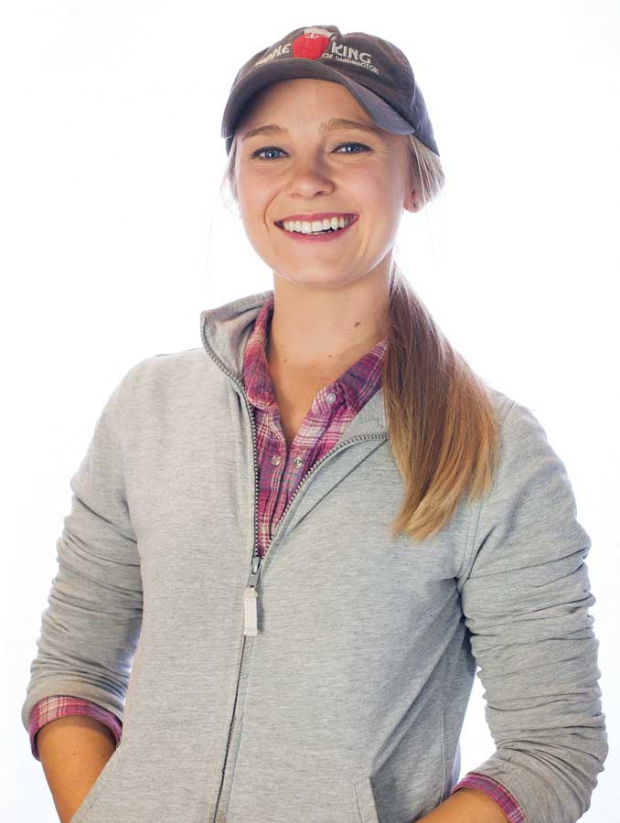grower / Grandview, Washington
 age / 24
age / 24
crops / Apples, cherries and juice grapes
business / Fieldman for Apple King. Partner in family run Eddie Farms.
other experience / Graduated from the tree fruit program at Wenatchee Valley College.
How did you get your start?
After college, I worked for Apple King as a fieldman. That first year I not only got the ability to work with people, but I also had the ability to make mistakes with people. So a lot of my education came from making mistakes with people. There’s only so much you can learn in the classroom and there’s a whole lot more you learn out in the field.
What excites you about farming?
Eddie Farms is always expanding. We are always looking for land—trying to better our business and our farm. One of the things we look into is the research that WSU (Washington State University) is spearheading with new varieties—the new lottery apples, like the WA38. We’re just trying to educate ourselves enough to make a business plan to see how can we better our farm.
What successful projects are you working on?
Right now we are trying to develop our own way of training apples. While taking a shower, my husband actually thought up a trellis system that basically looks like a bird house. I didn’t know about it until he put it all up and I said, “What the heck are you doing?” He said, “Oh, I thought of this, so I did it.”
I thought it was ridiculous and it’s right along the road and all of our neighbors think it’s ridiculous, but it actually worked out. We’re starting to get higher yields on our Honeycrisp. We reduced wind damage because of the trellis. We’ve trained the branches up the angles, so we can produce more.
What do you see as the next step in your growing role in farming?
I think it’s very important that you don’t just educate yourself and make yourself better, but you share it with the industry making it better. One thing I love doing is teaching people. If someone doesn’t know a single thing about apples—I can talk for hours and hours about it.
We have people drive by, stop, and ask “What are those big fan things in the orchard?” I keep my thoughts to myself and laugh a little bit, and say “they are wind machines for frost protection.”
I know that when I educate them, the next time they drive by they will educate the next person, who will educate the next person. I think it’s very important, as the next generation, as a young grower, to absorb everything you can and make yourself a better person and better farmer—then share it with everybody.
What recent projects make you particularly proud?
One thing that I take a lot of pride in is being accepted into the Washington Agriculture and Forestry Education Foundation’s leadership program—which is an elite and respected leadership program.
When I got into it I thought, what am I doing, this is not for me. When I went to my first seminar I looked around and it was all older men and women who have more experience and I felt lost. But what they said to me was ‘wow, people in the industry recognize you as a leader and you are so young. What did you do and what can you do? ‘ I said that I didn’t try my hardest, I just did my best.
The fact that people in the industry recognize me as a future leader makes me feel like I can do something about this (industry.) I’m so thankful that people gave me the confidence that I can be somebody larger than I am now. I take pride in the fact that I educate myself, I have a drive, I want to be a leader, I want to change the industry.
What kind of stumbles have you had on your way?
One time, we were going up a hill pulling a trailer with a fork lift on. We didn’t have the fork lift tied down because we kept taking it off the trailer, while unloading bees. My uncle asked, “Are you in four-wheel drive?” and I said, “Well, no.” So I slowed down to flip it into four-wheel drive and he yells, “No, no, no, no, no! Don’t slow down!” so I sped up, and the fork lift fell off the trailer, went down the hill and into a tree. Now, for the rest of my life, I know that if I’m going up a hill hauling something heavy, I’m going to put it in four-wheel drive before I go up the hill.
Describe your successes.
At Apple King I will pick up grower whose last warehouse didn’t communicate with their fieldman. They didn’t know what was going on, they ended up getting a poor return and they thought it was their fault. I always work with them, showing them what I noticed. Even on varieties that I don’t deal with, like cherries, I will say something like, “Hey, by they way, I noticed that you have some gummosis in your trees and you should talk to this person about copper spray or something.”
They’ll come up to me and thank me for the help, saying “because you said that I am able to make my orchard better.” It’s just hits you, like, wow, if I hadn’t said anything, he could have lost money, he might have had to pull trees out. I realized it’s the little things you do for people.






Leave A Comment